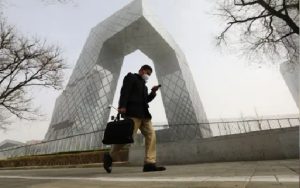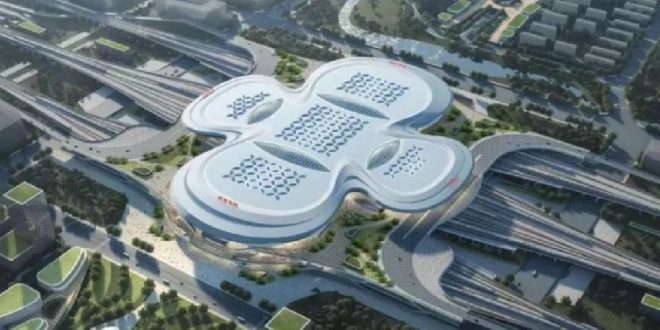17-04-2024
BEIJING: The proposed design of a train station in the Chinese city of Nanjing has attracted the attention of Chinese internet users for all the wrong reasons.
Authorities say the design of the North Nanjing station takes inspiration from plum blossoms, which the city is known for but online, others are pointing out its resemblance to something rather different, a sanitary pad.
 “This is a giant sanitary pad. It’s embarrassing to say it looks like a plum blossom,” said one comment on social media site Weibo.
“This is a giant sanitary pad. It’s embarrassing to say it looks like a plum blossom,” said one comment on social media site Weibo.
The topic has generated millions of views across various Chinese social media platforms.
“Why can we all tell it is a sanitary pad immediately, but the architects can’t?” one Weibo user said.
“I think we should take this chance to call for society to pay attention to period shaming. This design is ahead of its time,” another user joked.
According to state-owned newspaper Nanjing Daily, the preliminary design was greenlit by the government of Jiangsu province and China State Railway Group.
Construction is due to begin in the first half of 2024, according to local media.
According to a 2017 report by news site the Nanjing Morning News, the train station is estimated to cost some 20 billion Chinese yuan ($2,763 million; £2,224 million), and will sit across a total area of 37.6 square kilometres (14 square miles).
This is not the first architecture project in China that has drawn unexpected attention.
The headquarters of state broadcaster CCTV in the capital Beijing is known to many in China as the “big boxer shorts” building, for its unique shape.
However, China’s economy made a stronger-than-expected start to the year, even as the crisis in its property sector deepened.
 According to official data, gross domestic product (GDP) expanded by 5.3% in the first three months of 2024, compared to a year earlier.
According to official data, gross domestic product (GDP) expanded by 5.3% in the first three months of 2024, compared to a year earlier.
That beat expectations the world’s second largest economy could see growth slow to 4.6% in the first quarter.
Last month, Beijing set an ambitious annual growth target for world’s second largest economy of “around 5%”.
Data from the National Bureau of Statistics (NBS) also showed first quarter retail sales growth, a key gauge of China’s consumer confidence, fell to 3.1%.
“You cannot manufacture growth forever so we really need to see households come to the party if China wants to hit that around 5% growth target,” Harry Murphy Cruise from Moody’s Analytics told media.
In the same period property investment fell 9.5%, highlighting the challenges faced by China’s real estate firms.
The figures came as China continues to struggle with an ongoing property market crisis. According to the International Monetary Fund (IMF), the sector accounts for around 20% of the economy.
The latest data also showed new home prices fell at the fastest pace for more than eight years in March.
The real estate industry crisis has been highlighted in January when property giant Evergrande was ordered to liquidate by a court in Hong Kong.
Rival developers Country Garden and Shimao have also been hit with a winding-up petitions in the city.
Last week, credit ratings agency Fitch cut its outlook for China, citing increasing risks to the country’s finances as it faces economic challenges.
At the annual gathering of China’s leaders in March officials said the economy grew by 5.2% in 2023.
For decades the Chinese economy expanded at a stellar rate, with official figures putting its GDP growing at an average of close to 10% a year. (Int’l News Desk)
 Pressmediaofindia
Pressmediaofindia




